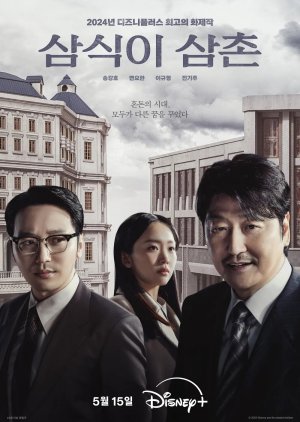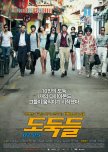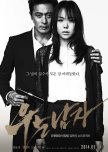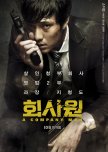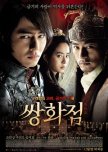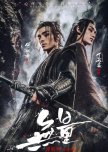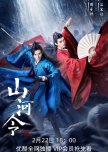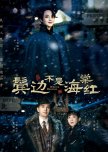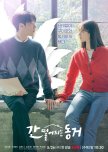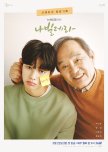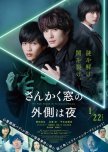
This review may contain spoilers
Great performance & complex narrative re. challenges in politics during dreary SK post-war decades
"Uncle Samsik" offers a quite interesting narrative of the complex connections between party politics and the even more crucial backroom politics during South Korea's first republic (1948-1960). The KDrama is primarily set in the run-up to the turbulent events and nationwide demonstrations that led to the resignation of the first President Rhee and the founding of the second republic. However, the nation that had hoped for real democracy and prosperity stumbled into a third one just three years later through a military coup. Although this brought the hoped for prosperity via totalitarian capitalism, it was still far from real democracy...The story of the KDrama is based on historical events, themes and people of that time, but is ultimately fictional - even if historical film sequences are occasionally interspersed as part of the April Revolution. The focus is on Uncle Samsik. For all those, who don't know much about South Korean history, Uncle Samsik is the emotional reference figure and dramaturgical bridge that holds all the politically complex threads together. Even without prior knowledge, "Uncle Samsik" offers an exciting, haunting political drama that takes place in the post-war years. It is in particular thanks to the passion of the great actors who manage to captivate the audience with comparatively 'dry' fare. It is advisable to watch the episodes consecutively so as not to lose the thread.
With a fictional plot the well-known historic events and what actually drove the political actors of that time are portrayed from different perspectives. Thus they are shown as multifaceted people with complex motives and stories. Political calculation becomes tangible through relationship dynamics and formative personal experiences. What created the conditions for that dictatorial regime and its totalitarian capitalism to torpedo South Korea into dazzling prosperity - the needs, hopes, ideals and concerns underlying the political actors - are being filled with life. And at the same time also what the young democracy still has to gnaw at today - authoritarian directive, opaquely networked and strictly hierarchically structured backroom politics.
The time in which the KDrama is set is marking the initial struggle to set the course for 'right' politics and a democratic political culture to start with. You have to keep in mind that Korea has not yet been able to gain much experience with modern, international politics and economic policy on the world market. Until the end of the 19th century, the Joseon Kingdom had isolated itself from the rest of the world and concentrated on itself. Western modernity and international influences increased during the early 20th century, especially while the Korean peninsula was a colony of Japan. The guidelines for political autonomy and independent parliamentary politics were only set in the course of the founding of the Republic of Korea as South Korea in 1948. And even then, the USA kept a close eye on the young republic. The people in South Korea had not yet been able to seriously experience themselves as political mature people of a democratic country... The south, by now isolated from its rich in raw material and industrially well developed north, was at that time one of the poorest agricultural countries in the world.
Uncle Samsik vividly depicts the conflicting feelings in the country. He represents the prevailing longing for wealth... or simply for three meals a day. Uncle Samsik's nickname already reflects what he stands for: sam (eum)sik = three meals. He (as a good uncle) grants this to his people. So actually this very basic human need was the top priority in those politically turbulent years. Hunger and poverty shaped everyday life for the many. Democracy as a political ideal may sound good, but it doesn't fill your stomach. Samsik cares about people. His political goal is to use all possible means to support those politicians who have a solid concept and can bring the country to a point where the people will soon have enough to eat. The way to get there: to consistently boost the economic power of the economically weak country (compared to the north) and thus create appropriately paid work whose salary is enough to provide for the families... even if that might imply that the people´s hope for true democracy still has to wait a bit longer...
So would I recommend "Uncle Samsik"?
Yes, but...
It's one of those things with historical dramas that deal with Korea´s recent post-war history (and with the KMovies about the first post-war decades, too... you have to want to see it. Colours, light, selection of protagonists - this is often enough inevitably not a treat. Colorful robes that were still common in Joseon times are rarely seen anymore. After the Japanese colonial period and at least since the influence of the USA in the wake of the Korean War, fashion has been completely westernized. This makes the production design comparatively rather dreary - dark suits, ties and plenty of scenes inside or in the dark. It is about scenes inside offices, hotel bars, conference rooms and bunkers instead of lushly planted palace gardens, picturesque bridges, colorful pavilions and pagodas, or the shaded, meditative palace walkways - it's all history. Politics by now happens behind closed doors. If suitable, it might sooner or later end up on the streets, too. Female characters with impact are also rare - gone are the lively days of palace ladies, servants and princesses, scheming dowagers and queens or spying gisaeng... Instead, there are lots of serious men in their (as I mentioned before) dark suits, preferably smoking and debating or giving orders in back rooms. Politics is a man's business - a power struggle that is eventually resolved with the help of thugs and cloak-and-dagger operations... (After all, women's power is at least trying to carve out some space in "Uncle Samsik"...)
In short, the setting is rather dark, complex, even complicated - and ties-heavy. Be aware.
Apart from that, "Uncle Samsik" is really well done. Vividly played and thematically differentiated, the KDrama brings those dreary, sobering post-war decades in South Korea to the international DisneyPlus audience, presenting it as a time that, despite all the prevailing corruption, arbitrariness and obedience to authority, was also characterized by a lot of idealistic passion and political hope. Once again, high-end historical drama à la KDrama...
Was this review helpful to you?

On One Hand Intrigue, Betrayal, Redemption - Other hand Democracy, Power, and Sacrifice
A MUST WATCH PERIODICAL POLITICAL THRILLER FOR EVERYONEFIRST POINT:
Before going to my thoughts, I want to say something: I majored in political science and civics subjects and had some experience in history. I know everyone will think about what I’m trying to say about my subjects. The reason is that all of this is made for the boy who loves politics in real life, not only in dramas, movies, and shows. So, whenever I hear there’s a political drama, I always wait for them, irrespective of the cast, because complete political dramas are so rare and are used as side elements in some dramas. I watched a political thriller a long time ago, “Designated Survivor,” which was one of the major political thrillers in kdrama. It started very well but failed to impress with the last episode. Overall, it was a good political thriller without the last two episodes.
Second point:
My second point is that I became a periodical genre fan after watching some kdramas, impressed by their visuals, art, custom designs, story set-up, and mostly because I had the chance to watch the 90’s and sometimes 80's culture of Hanguk. Recently, I watched “Chief Detective 1958." I loved the drama’s 1950-60’s art and everything.
So, I think everyone understands my two points on “Uncle Samsik” before going to talk about my thoughts. And everything I write in this review is purely based on my thoughts and what I experienced from the drama, both emotionally and critically.
A group of wealthy political members is trying to create political instability in South Korea between 1950 and the 1960s to encash that opportunity to take over the country's power into their hands and make them whatever they want. For real, there are some groups that existed in this generation too, like Deep State in the USA (this is only for reference and not intended to compare any political issues with it; https://en.wikipedia.org/wiki/Deep_state_in_the_United_States ). To stop them, some other people, both political and non-political, are trying to bring that group down, like the main leads, Doo Chil, Kim San, Hanrim, and some other military members. But each of their ideologies is different, but their main objective is to carry the country forward to development and keep democracy in the country. Each character clearly has a motive, trying to protect the democracy of their country.
CHARACTERIZATIONS -
In Kim San's character role, I really felt the way he used to dream about the country’s development project, “National Reconstruction Plan.” He did everything and sacrificed his life things in the way of life dedication to the nation, even sometimes breaking his ideologies to create a better country for his people. TBH, I loved Kim San's character (Byun Yo Han), even though he sometimes chose the wrong steps to form his dream project. Byun Yo Han, you did an excellent job. Pure acting masterclass, the emotions, and the way you portray his views on the nation's development are truly amazing. I hope I will see you in more dramas in the future.
Song Kang Ho is the acting pillar of this drama and a well-known veteran actor. Exceptional performance in the Samsik role; this one is the character I can’t forget easily. The director’s choice of Samsik and Kim San roles is one of the best castings done by casting gods.
The Jan Ki Joo role was introduced very well in the beginning, and I expected the same character length from her till the end since she is a journalist, but after 6 episodes, her character was only used to show, oh, she is also a character in this drama, but there is no big scope for her. This is one of my disappointments with the director.
A remarkable performance by the supporting cast and every actor’s exceptional effort made this drama a truly outstanding drama in kdrama land.
NARRATION -
Every episode is full of talkative mode more than taking action. Of course, this is political drama, so most of the scenes and most of the time are carried by the characters talkative mode, and we will expect something more than talkative only in the climax or pre-climax. This drama shows how situations can change a person and persuade him to go to any lengths to do what he wants in the political sense. Since it’s a political genre, we have to expect betrayals, allies, and foes in the way of choosing a path to take or implementing the things we have to do, both politically and geographically.
The relationships of Samsik between other character roles will meet us in different ways, like when he sometimes looks evil and good, but one thing never changes: his loyalty towards the people he trusts. There are no flaws in writing or directing.
DRAMAS BIGGEST ASSET - SCREENPLAY & STORYTELLING.
Uncle Samsik follows the nonlinear storytelling aspect, which creates dynamic storytelling by using screenplay magic elements like flashbacks, flashforwards, multiple points of view, and non-sequential structure of the story. Handling these types of elements often confuses the viewers, and I also faced the same confusion in some dramas with nonlinear storytelling, where scenes constantly jump from one time to another without much clarification, like whether it's a flashback or current running story narration. But in this drama, every scene is perfectly placed where it fits and is not given a chance for story narration confusion. Overall, a fantastic “SCREEN PLAY”.
ONE OF THE BEST EPISODE EVERY MADE IS KDRAMA -
Specially talk about the 14th epic episode—to me, it's one of the best episodes ever made in a kdrama because it was based on the real events of South Korea in the 1960s called the April 19th Revolution ( https://en.wikipedia.org/wiki/April_Revolution ). The representationalism in the 14th episode showed how that revolution happened. Here, I’m bowing to the director because the way he brought the historical change movement to us is really breathtaking and a spectacular episode.
My Only Disappointment:
1) NO big scope for Jan Ki Joo's character role even though it has potential and failed to use her character's professional job Journalism in the story changing way. Usually, Journalism vs. Politics is the greatest El Clásico in nature, but the director is mainly focused on bringing political momentum and ignores journalism. But I’m not saying he completely left the journalism point, but he used it in a narrow way to move some scenes forward; even in the scene about Ballot Box being stolen, there is no strong focus on the press.
2) ENDING:
After watching the first episode, I got an idea about the ending but never expected this type of ending. I know it’s good for writers to write off a main character in periodical or historical dramas. But the director of Uncle Samsik made a very bold move in the ending. I don’t know about others who watched this drama or what their opinions were on the ending, but to me, it’s one of the most disappointing endings in the kdrama. The basic element of every drama is that good is the winner over evil, but I don't know what the director is trying to say with that type of ending; I think he wants to say, “No matter how hard you try to change the country or bring down powerful, evil political figures, there is no turning back; you will only suffer losses and states that the outcome may not be favorable; the effort may result in personal sacrifices or negative consequences of what is going on now.”.
I don’t want to talk more about the ending; watch and take your own opinion, but personally, I’m disappointed.
Was this review helpful to you?
Red Bun Coalition ♟️ The Means Rustify the Soul °8.4° °Excellent°
Corruption: the process by which something is changed from its original use to one that is erroneous or debased. A departure from what is pure or correct. Decay, decomposition, dishonest or fraudulent conduct by those in power, typically involving bribery."Sometimes I wonder whether the world is being run by smart people who are putting us on, or by imbeciles who really mean it," said Mark Twain. Even if leaders want the right things, too often they are willing to do the wrong things to get them.
US is a historical political fiction thriller based on true events. Three characters are based on actual historical figures while everyone else seems to be an amalgam of other players that created the political debacle of 1959-60 in SK, Uncle Sam being the most amalgamous. Communism was spreading, the world was in chaos. World War II had rewritten the map of the world. The North and the South Koreans were at odds. SK was closely monitored by an on-site U.S. military. This is one of Director/writer Shin Youn-Shick (Cassiopeia) higher rated offerings. “I think Korea is the only country that asks if one has eaten as a greeting. (The series) portrays the difficult times right after the Korean War, when it was truly challenging to have even one meal a day,” Shin said. Yet it was politics as usual at the top. These back-room ghouls think nothing of the suffering masses.
Not interested? I gravitate to the imaginative side of entertainment myself - Sci-fi, thrillers, fantasy… romance. We have to make an effort to try new things to be more well rounded. As such, one could tag me a somewhat reluctant viewer. Around Ep5 it became clear that this is an excellent drama. US might not be my go-to genre, but it is an excellently created show. It starts like a tank. It grinds slowly but really cranks up towards the end. The acting and directing are sublime. What's most important is that it's a peek under the hood of politics, another reminder that politics is overrun by hoods. “This is what it means to be in politics,” muses Joo In-tae. His daughter had just asked him how he could work with a guy who had tortured him during the Japanese occupation. Many well meaning people do jump into the “public service” foray with the intent to ‘do-good’, but they slowly get absorbed by a system that pumps out ‘doo-doo’. Politics is one big manure spreader. As KS says, it's “Hypocrisy disguised as a dream.”
1960. The March15 Election Fraud is abt the rigged re-election of Syngman Rhee, in power since post WWII. That led to The April Revolution: A series of protests and demonstrations demanding reform that led to the removal of Rhee. We open in 1960, but the cars look older, indicating that money is scarce and they're getting by on older belongings and older technology. It is a dark, wet night and authorities are dragging away a man who is screaming that it's Samsik's fault. What is a Samsik? Well, he is a dude who made sure everyone in his circle had three meals a day. Even during the war. “Sam” means three. “Sik” means food. “Chingoo Chincha.” A true friend.
US is a 2024 release that is rated 86 on AWiki. It is 1 season consisting of 16 42ish-minute eps that positively fly by in comparison to a typical Kdrama. Not only is US an excellent drama, but it's also a primer on politics and the slippery slope that topples the naive. The good they sincerely want to do is the carrot. Getting reelected is the stick. It helps me understand politicians more and it also makes me despise politics all the more. It's a filthy, slimy business. Cliches are always based on entrenched patterns. The cliche, “Power corrupts and absolute power corrupts absolutely,” still rings true. The human race hasn't outgrown that problem. Voters and the general public seem to have the attention span of a fruit fly and the memory of an ostrich. We neither know nor understand our history. Therefore we are doomed to suffer corrupt leadership. It just isn't wise to put too much trust or hope in political leaders.
After we hear what a nurturing guy US Is, we revert to 1959 for a closer peek. There's protesters in Seoul. I've not seen one political Kdrama where that isn't going on. It appears to be part of the fabric of Kcountry. The opening eps go back and forth between that point & MPs questioning suspects in 1960. Questions? In ‘59 these guys staged a coup.
Samsik appears to be more mobster than businessman. He's slowly built up enough to enable him to buy into a chaebol level company - he's about to become a business baron. “Do you know what pizza is?” He's in a great mood and jawwing to someone at the meal before his induction ceremony. “You probably don't even know what cheese is.” He tries to explain pizza to a traditional 1959 Korean. It might as well be explaining the 5th dimension. Try explaining soy sauce to someone who has never had Asian cuisine.
Later that night, he's at a political rally to raise trouble, and the meeting does break up in mayhem, but then Kim San takes the podium. To paraphrase, he says ~I just got back from the USA. No one is going hungary. Every building shines. They don't even eat all their food. I lived above a pizza shop. Do any of you know what Pizza is?~ He goes on to talk of a vision where Koreans aren't starving but, rather, where Korea is the center for commerce in the world. Uncle Samsik is listening. Attentively. The scene is quite powerful.
Park Doo Chil (Snowpiercer) plays ML Uncle SamSik with his coat swinging; part of Sam's signature swagger. It's been 35 years since he did TV. Coming into US, I could only see him as he was in Parasite-9, w/ the greasy face and that smell. (I KNOW one can't smell anything through the TV. That is partly why Parasite is so brilliant!) He made an impression. He's excellent in Taxi Driver-8.4 as well, which is also half-fictionalized events based in a true setting and, historically, serves as a bookend to US. In US, PDC is indefatigable. His character is so alive, so energetic, so garrulous, so thoroughly compelling that, for someone with chronic fatigue, it's actually exhausting. US is a man that has gotten used to exploiting opportunities; it's such a habit that he never questions it. He understands that when your stomach is full your mind tends to open. He won people over by feeding them. We're not that much different than stray cats and dogs in that way. He is portrayed as a split personality. Like the best criminals, he's a savant of human psychology. He grew up poor. Therefore he says things like: “Do you like people that are admired? They're the worst.” Yet he fully embraces the system. He is fundamentally decent to those around him and he's generally loyal, but he has no moral backbone whatsoever. He operates outside of the law entirely. US opens up in ep2: ‘I love red bean buns. I could never afford them, but I wanted them so badly I killed a man one day.’
Byun Yo Han, who is positively luminescent in Mr. Sunshine-9 & Misaeng-9.1, plays Kim San/KS, a man who has the best of intentions but gets marinated and stuck to the bottom by the political sauce. Mr. Byun shows that he can play a serious role. Other actors can as well, but what other actors can't do is capture the magic of the other characters BYH has portrayed. He conveys a nearly tangible sense of delight. That is rare magic, indeed. KS has a soft spot for people that recognize his worth. That only means that he's too self-focused, and his pride is too important to him. It's something that will trip us up. He is so determined to pass his economic reform pkg, (it would be wonderful for Kcountry) that he's willing to do anything. ANYTHING. He thinks he can wash away the stink later.
Lee Kyu Hyung (Doctor John) plays the spineless but powerful Kang Seong-Min. Even though he's a beautiful man, he's terrifying because he's completely self-focused, he has no empathy, and he's gutless. If someone makes him the slightest bit nervous, he orders a hit on them. Choo Sang-Rok is Park Ji-Wook. During the Japanese Occupation he was a quisling and worked as a police officer on behalf of the occupiers. In 1959 he’s a prominent politician. Tiffany Young (Reborn Rich) is marvelous as Rachel Jung. Jin Ki Joo (My Perfect Stranger) is Joo Yeo Jin, KS's fiance, as the show opens. Seo Hyun Woo (Flower of Evil-8.9) plays Jung Han Min.
Those based on true historical figures:
~Ryu Tae-ho as Choi Han-rim: a prestigious general who KS calls a 2nd father. WIKI - “Based on Lee Han-lim, he is known for his political neutrality and being the only commanding officer to declare public opposition to the May 16 coup. After graduating from Shinkyong Military Academy and studying at the Imperial Japanese Army Academy, he served as an officer… was a classmate of Park Chung Hee,” part of the Imperial Japanese Arm & finally 1st Army CDR when the 5/16/60 coup occurred. “He opposed the military's intervention in politics and stood on the opposite line from those who led the military coup of Park Chung-hee. He had prepared to mobilize reserve forces to suppress the coup, but withdrew to prevent a civil war and potential North Korean invasion. Due to his opposition, he was arrested two days later and discharged along with the 5th District Commander and Army Major General Park Ki-byung.”
~Park Hyuk-kwon “as Choi Min-gyu: Minister of Home Affairs who collaborates with the Liberal Party government. Based on Choi In-gyu.”
~Oh Kwang-rok “as Joo In-tae: a politician who insists on national prosperity and peaceful coexistence. Loosely based on Cho Bong-am. …Three years after the election, Cho was charged with espionage and receiving funds from NK. His first trial resulted in an acquittal but he was convicted in a second trial and was executed on 31 July 1959. His death sentence was posthumously overturned in 2011 by the South Korean Supreme Court.”
The Albright Stonebridge Group is a real Foundation committed to economic growth in SK.
The slippery slope. KS is courted more than a duke's only daughter. How does Samsik seduce him? With intoxicating statements like this: “Nobody gets to fulfill more than 25% of their desires. Nobody gets 80 or 90% so what do you do? You increase your desires by 40-50-60%. Have ambition.” When KS finally succumbs, he has this conversation with the party chief: “I don't need nice guys. We are waging a war here. I won't tolerate any tears.” “I've already shed all my tears. I'm done with that.” By that time he had abandoned his fiance, ignored dozens of illegalities, and had started sewing the seeds of revolution. Samsik stays in the shadows. One might almost think he invented subversive triangulation, but apparently politics is the same at all times and in all places. It's a filthy business in which those in power take advantage of those in need. Catch rivals committing crimes? It's merely an invitation to control them. Turning them in is the last thing that US would do. Even so, Samsik and KS form an unbreakable bond. They have good goals that they intend to implement by any means possible. Following proper channels never even occurs to Samsik, and he manages to slowly and steadily bend KS to his will.
It's always the things that we think we know, our faulty presuppositions, that are going to bring us down. “There was an explosion of people that spilled onto the streets instantly. Ultimately, none of the promises or plans we made mattered at all… No one could have predicted the way the winds would take us, or or how the waves would crash.” The director is adept at building up tension throughout the show. It explodes into the protests. There's an aerial shot of marchers that pans several blocks. It's really spectacular. Next, he intersperses the filming with genuine newsreels from the time itself. It's quite emotional. Another nice touch is how KS is gifted a light grey suit. It stands out amongst the unified dark suit coalition. I think it represents how his white intentions became muddied and gray through his interactions with US. In the last ep KS wears a black suit. His eyeglasses are two tones of grey.
Uncle Sam knows things are going sideways in the last ep. He can sense it. He looks at the hotel lobby. People are chit-chatting, drinking and going on with their evening as if nothing's happening. They're completely unaware of the day, of the country, & of the rotation and revolution of the earth. Isn't that always the case? The soldiers enter. It's a profound scene.
US, himself, is often profound. We'll let him close this out: “Let me ask you about the principles that govern this world. Spring arrives, then summer. Flowers bloom, then wilt. They're what make the World Go Round And the sun rise and set. The Earth's rotation and revolution. Can you feel it right now? The rotation and revolution? That's precisely the kind of man I am. The Earth's rotation and revolution…” (looks like the earth still goes around without him). “Sometimes I feel… I feel tossed aside in the world, completely abandoned. I'm flooded with loneliness. It's in those times that I find what I fear most of all… is when that loneliness… becomes familiar.
(more) 〰️QUOTES〰️
So you think love is trivial? Guess you don't know much about love.
People think they're different from each other. Eventually, they figure out they're all the same. When they figure it out, it's too late.
You have a bad habit. You underestimate people who are younger than you. You need to fix that.
An honest politician is one who, when he is bought, will stay bought. ~Simon Cameron US financier & politician, 1799-1889~
✏〰 IMHO
Ratings
Directing 8.3
Writing 8.5
Acting 8.5
Romance 3
Flutters 4
Warmth 4.5
Art 8
Sound & music 7.5
Ending 9
Levels
Excitement 5.5
Laughs 2
Tears 6
Fright 3
Tension/anxiety 3.5
Gore 3
Thought provocation 7
Snores 0
📣8.3 📝8.5 🎭8.5 💓3 🦋4 🎨8 🎵/🔊7.5 🔚9 ▪ 🌞4.5 ⚡5.5 😅2 😭6 😱3 😯3.5 🤢3 🤔7 💤0
Age 14+
Language Rated-R Fbombs, some violence, gore, and scares, but the tradeoff is the primer on politics and human relationships. This is an educational jaunt as well as an excellent drama.
Rated TV-MA
Re-watch? Would
Was this review helpful to you?
Very very dense
This will be a quick review as I'm struggling. I want really to like this show because it has a stellar cast. However, it is very very dense and needs your full attention. Even though my grasp of modern Korean history is so-so, it still didn't help me in this show.The first episode just drops you in and you don't really know what's happening and who everyone is. However, I can see the bones of a good story unfolding. One does need patience. I will update the review again at the end.
Update: It was still very dense at the end. Too many side characters and trying to keep track of each character's dynamic agenda and ever-changing allegiances was tiring.. It felt like the show's writers tried to keep it true to history (interspersed with historical segments), yet it was not meant to be historical (as the beginning caveat clearly states).
Was this review helpful to you?
This review may contain spoilers
You will love the journey with uncle Samsik!
It is very easy to watch and follow the events even if you are not familier with the Korean history. It is story how the politics really works to gain money and power.The acting is great and I love the relationship that uncle Samsik had with San. Samsik is real genius who's always come up with the plan and it is fun to watch as he is always ahead of everyone. I was so surprised that in the end he is betrayed and oversmarten by someone you would not expect at all. Till the last minute I was hoping he has other plan to get out of the situation. The ending was very emotional. I guess it ended as it should as in the end the money and power always win. It would be great to see Kim San to take a revenge....
To be honest I don't understand why the rating is so low and the drama is not very well known.
Was this review helpful to you?

It had great acting, almost like a sequel to Mr sunshine and the continuation of future problems
really great acting, heavy plot, in ways, knowing a bit here and there of korean history, their past that led them here, and the future which comes in movies like Best Friend, things make sense
they wanted to change but it wasn't the right time and as samsik said, it was like the pebble that effected the future
really tho actingwise they deserve daesangs and many awards
once power and scheming happens, it became a man’s world, and greed, double crossing, changing sides, scheming, they did have two interesting female characters, in a pool of 20000 men
1960s tho, this was also pre “communist” labeling so I guess, no matter who was “good” and “bad”, things continuing escalating
It has A+++++ lvl acting🧐 so I don’t regret watching and staying , I have no idea what was happening, worse than money game and their financial money talk
Was this review helpful to you?

Was this review helpful to you?
So far so ok
This one requires your undivided attention. With the amount of dates, groups, and characters thrown at you from the start, you're playing catch-up. After two episodes, I'm still lost on a few things. The premise is interesting but lacks an emotional hook. It reminds me of the political thrillers of the early 2010s with its gray color scheme and its super serious tone. Hopefully, once I catch up to the story it's selling, I can attach more to it. Since Hulu released the first 5 episodes at the start, I'm more inclined to give this a few more episodes as opposed to if it was released weekly.Was this review helpful to you?

